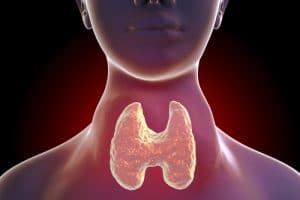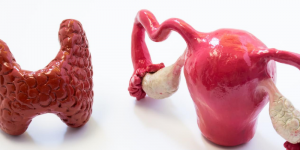This article will explore and explain the often puzzling link between thyroid health and infertility in both men and women.
What Is the Thyroid Gland?
The thyroid is a butterfly-shaped gland located in the neck area. Controlled by the master gland, the pituitary, which is located in the brain, the thyroid releases several critical hormones important to the body’s metabolic functions. The pituitary releases a substance called TSH, which stands for thyroid-stimulating hormone, and in turn, the thyroid produces two main hormones called T3 and T4. You may recognize the full name of T4, thyroxine. Many people taking a prescription thyroid drug are taking a form of thyroxine.
There are two main types of thyroid dysfunction. One is called hypothyroidism, where the thyroid function is too low. The other is known as hyperthyroidism. This means that the gland is functioning at too high of a level to be healthy. Both can be treated, and while both can definitely interfere with conception, neither should be a serious obstacle to a successful pregnancy as long as the condition is treated properly.
Problems with thyroid function can be caused by numerous things:
- Goiter
- Hashimoto’s disease
- Lack of dietary iodine
- Genetic factors

A family history of thyroid disease makes a person more likely to develop it themselves. Some general symptoms of thyroid dysfunction include fatigue, depression, weight gain, feeling cold, menstrual problems, pale skin, hair loss and insomnia. Thyroid dysfunction can also cause mood swings and even heart problems in more severe cases.
Thyroid Health and Infertility
Many people think only of the female when it comes to problems with conception, but thyroid dysfunction can cause infertility problems in both sexes. Thyroid hormones are closely linked to the production of both main female hormones, estrogen and progesterone. There is a kind of feedback system in place as well. Menstruation, critical to conception, is closely regulated by the thyroid. An overactive thyroid can cause both miscarriage and premature birth. Birth defects are also possible because the developing child relies heavily on its mother’s thyroid hormones for normal growth. Generally speaking, both hypothyroidism and hyperthyroidism can be successfully treated with medication. Once the underlying condition is under control, the chances of conception are good.
Thyroid Dysfunction in Men
Hypothyroidism in men can cause a variety of fertility problems. These include:
- Enlarged testicles
- Abnormally shaped sperm
- Low blood testosterone levels
- High prolactin blood levels
Of the above, the issue of abnormally shaped sperm is the most serious. Hypothyroidism can also cause low sperm motility and a weak outside structure of the sperm cell. Both of these conditions impair and reduce the chances of conception significantly. An underactive thyroid gland problem is very treatable with levothyroxine, which is a synthetic form of the body’s own thyroxine. It typically restores normal thyroid levels and related body functions in a very short time. Most people will need to continue thyroid hormone therapy for life, both to avoid symptoms and to avoid problems with thyroid health and infertility.
Conclusion
Thyroid health and infertility are closely linked and can definitely cause infertility problems in both sexes. However, these problems are usually easily treatable, especially when compared to some other causes of male and female infertility. Blood tests will easily reveal exactly what the status of your thyroid function is, and from there, it’s typically a fairly simple medical fix. You may find yourself soon holding your precious newborn after all.




